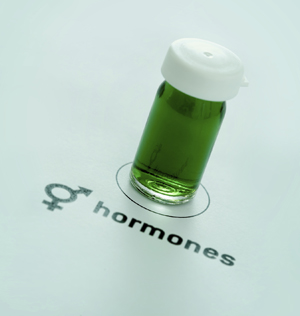
Menopause is defined as 12 successive months without a menstrual period; the average age of menopause for women in the U.S. is 51 and a half.
by Gayle Mason —
Do you ever find yourself saying, “Is it hot in here or is it me?” Ah, the menopausal transition has begun. Menopause is defined as 12 successive months without a menstrual period; the average age of menopause for women in the U.S. is 51 and a half.
Perimenopause, however, is the time leading up to menopause when periods often become erratic and symptoms are problematic. For generations, women have entered this phase of their lives without the slightest clue about the taboo subject, or how to find relief. This is finally changing.
Thanks in part to Suzanne Somers, we now have a lot of talk about bio-identical hormones. Biochemically, they have the same structure as a woman’s natural hormones so the body recognizes them and side effects are minimized. These are commercially made bio-identicals, as well as compounded.
One size does not fit all when it comes to hormones, and the advantage to a compounded prescription is that it can be ordered and made in any dose necessary. Those from pharmaceutical companies come in only standard doses and cannot be altered. The commercially made bio-identical hormones, however, have the advantage of being covered by insurance, while sometimes the compounded ones are not.
Progesterone is the first sex hormone to decrease with age in women. In fact, it is possible that no woman at age 40 has a normal progesterone level. Symptoms of a deficiency of this hormone are often a woman’s first complaints, which include sleeplessness, irritability, anxiety and sadness. Providers can often misdiagnose the symptoms and erroneously put women on antidepressants.
A decrease in progesterone leaves women estrogen dominant, which then potentially puts them at risk for estrogen-related problems such as breast or uterine tumors. A decrease in estrogen, though, is often accompanied by vasomotor symptoms, “hot flashes” and “night sweats.” Sometimes women actually have to get up and change their perspiration-soaked bedding at night.
Eventually, other issues of concern for menopausal women include a decrease in bone density; vaginal atrophy resulting in vaginal dryness; painful intercourse; and feelings of urinary irritation. This is the time for estrogen supplementation. It is crucial to supplement with progesterone as well, bringing back hormonal balance.
In some cases, a local estrogen, in a cream or tablet delivered directly into the vagina, will be sufficient to resolve problems. Yet on occasion, for personal or medical reasons, a woman cannot supplement with estrogen at all. This is the time to focus on diet, exercise, vitamins and herbals.
The menopausal women of today are the Baby Boomers, and they are not about to go quietly into the night. Women are living longer than in previous generations and continue to be physically and socially active. Bio-identical hormones can ease the way and help them to remain healthy and strong.
Gayle Mason is a board-certified women’s health nurse practitioner and holds a subspecialty certification as a menopause clinician. She can be reached at the Arizona Center for Advanced Medicine, 480-240-2600, www.ArizonaAdvancedMedine.com.
Reprinted from AzNetNews, Volume 29, Number 3, June/July 2010.





February 26, 2012
Anxiety, Diet, Exercise, Vitamins, Minerals and Supplements